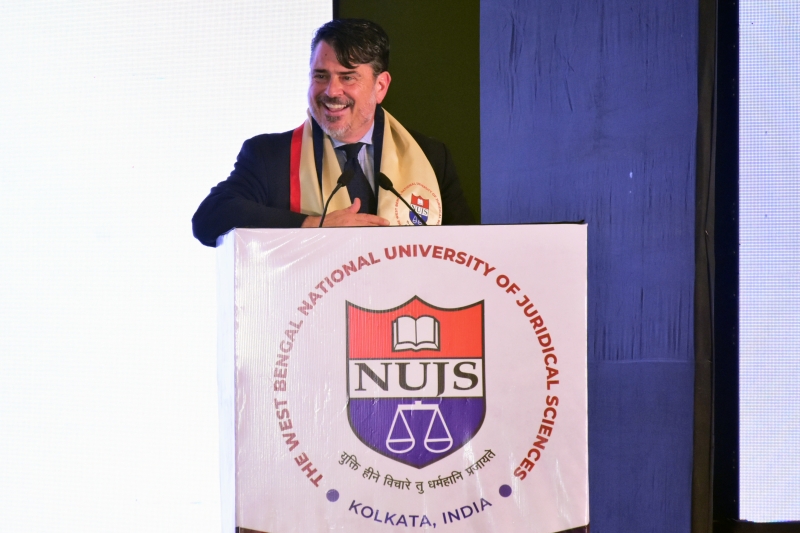Mark Drumbl Delivers Keynote Address on Tokyo Tribunal Justice The event examined the legacy of Justice Radha Binod Pal, who served on the Tokyo Tribunal from 1946-48.
Washington and Lee law professor Mark Drumbl recently traveled to Kolkata, India to deliver the keynote address at a symposium on the legacy of Justice Radha Binod Pal, who served as the Indian judge on the International Military Tribunal for the Far East in 1946-1948. Justice Pal was born near Kolkata, in a small village that is now part of Bangladesh following the partition of India. He was both a judge and professor in Kolkata before being appointed to the Tribunal.
The Tribunal, also known as the Tokyo Tribunal, prosecuted 28 high-ranking Japanese defendants for war crimes, crimes against humanity, and crimes against the peace following World War II. It was set up by U.S. General Douglas MacArthur as a counterpart to the Nuremberg Tribunal for crimes committed in the Pacific Rim.
While the Tribunal convicted the defendants, Justice Pal delivered a stinging dissent in which he would have acquitted each defendant. While recognizing that crimes had been committed by Japanese leadership, Justice Pal acquitted on the basis of retroactive application of the law for some charges and a lack of command responsibility evidence for others. According to Professor Drumbl, Justice Pal’s dissent is seen as the starting point for the development of post-colonial approaches to international law in that he held that Japan could not be punished for crimes of imperialism by a Western Tribunal that failed to adjudicate American war crimes (the dropping of atomic weapons) as well as Western histories of colonialism in the region.
In addition to delivering the conference keynote, titled “Justice Pal’s Legacy,” Professor Drumbl spoke on a panel on Justice Pal’s legal philosophy and its modern applications to international environmental law. He also delivered the closing colloquy and participated in a press conference about the event. He was joined by scholars, judges, activists, and students from a broad range of countries, including from many Indian universities.
The proceedings of the conference will be published in book form. Professor Drumbl has previously blogged on the memory of Justice Pal in Japan, as well as published a piece in the American Journal of International Law on the power of memorialization in international criminal law with specific reference to Justice Pal’s place in the historical narrative of World War II. He is currently writing a stage play that imagines a trial of the U.S. scientific and military leadership for dropping the atomic bomb on Nagasaki, along with possible defenses.
If you know a W&L faculty member who has done great, accolade-worthy things, tell us about them! Nominate them for an accolade.
 Professor Mark Drumbl delivered the keynote at a conference examining the legacy of Tokyo Tribunal Justice Radha Binod Pal.
Professor Mark Drumbl delivered the keynote at a conference examining the legacy of Tokyo Tribunal Justice Radha Binod Pal.
You must be logged in to post a comment.